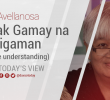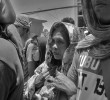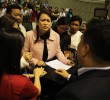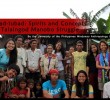Regardless of motives of politicians, consultation (or shura) as a legitimizing process in the Muslim-Moro culture cannot be equated with the justificatory instruments of unfair election. The elements of consensus leave leeway for free decision or selection. Misappropriations of shura by those who are less conversant with jurisprudence (or fikh) might lead to ruinous ends, thus further sowing discord (or fitna) that undermines Muslim society from within. This dreadful discourse preys on the conscience of the ulama sector — and scholars of Islam — motivating them to remain vigilant and prudent so that fitna can be avoided. Under Islamic jurisprudence, it is this same burden of responsibility to avoid fitna that privilege the ulama legitimately to declare jihad, armed struggle being its extreme form.
Obviously in the exercise of the right to vote, what has gone awry to a point of evolution to a culture of impunity is its very enabling mechanism seen in the latest election. At the polling place, the present Election Law allows a registered non-literate voter to be assisted in person instead of secretly casting the ballot through some identifiable icons or party symbols as realistically practiced in other countries like India or Thailand. Thus the Asian Foreign Election Observers on the Mission has reported that �there was very little voter education in the ARMM� compared to other Asian countries.
Writing about such dismal default in political education in this country, I have often argued that it is not enough to maintain a democracy. A poorly functioning republican system state has little regard for its bearing on good governance and citizenship that go beyond �voting once in a while and paying taxes all the time.� Having been elected delegate to the Constitutional Convention of 1971 made me aware at once that there is no correlation in absolute terms between literacy and numeracy to skew universal suffrage. Given current inclusive understanding, the discourse presently empowers those who are discerning about the right of choice (even though unable to read and write) so as to be entitled to the electoral franchise.
Against this backdrop of the flaw of the party system, and alongside the absence of genuine opposition candidates (political correctness demands opposing parties), it has proved appalling that electoralism is taking the Bangsamoro electorate nowhere. Consider the 12-0 results in Maguindanao favoring all the administration senatorial bets. Governor Datu Andal Ampatuan has chosen his headline story to emerge as trends proving “all politics are local.” Comelec�s move to investigate it is not the messy state of affairs that the strongman desires to find himself. Such are contemporary narratives to conflate a contrast with MNLF�s founder Nur Misuari who was routed when he contested the latest gubernatorial race in Sulu. Critics nowadays question whether elections actually took place in Maguindanao when what�s scant seems to strike a fear of the unknown.
The immediate politics for MILF is a problematic definable in terms of group loyalty (asabiya) based on culture, obedience or fealty to a leader based on (bay�ah) allegiance in Islamic tenets. It is cast not on a mechanism of selection in the Election Code. How easy is it to label MILF political concerns as agitation? That is to contrast the government of politicians that has reduced democratic spaces to procedural steps. Faced on the opposition side, this has demonstrably failed to show that there is a regularity of democratic change through popular will. Of course, election figures could look much lopsided than it is in purely statistical terms in tandem with the use of armed force. That is another story: here the voice of the people becomes the echoes. At this imprecise moment, the duty to obey (i.e. those in authority under shari�a law) does not mean to toe government line alone.
For brevity, my conclusion draws evidence at party level on lived experiences playing party ideologue, and taking seriously the role of Party Whip where political �turncoatism� practice turns on the handiwork of pragmatism. If any thing, while serving my term in Congress, it has provided me the immediate tool to reinvent part of the party system. To craft the enabling provisions of the Party List System, it was my research work that contributed creatively in addressing the modality for casting ballots and block appreciation of returns modeled on mathematically-proven German formula for party list representation. Voting has gone very differently now.
My sensitizing agitation is to organize political concerns in the present. It is a whole struggle over authority for the Muslim-Moro movement on a set of interests (less posited on theological point but essentially territorial) in which a number of movements can take place. Each of the political parties in the present set up entered the compromise quite uneven. An explanation relevant to my argument is in order. So unimaginatively, at Senate-House Conference Committee level, the ruling coalition and appointive “sectoral” representatives organized their efforts around a set of reified givens: the appointed incumbents, mixed group pressures on each other, and balance of majority-minority party. Nationwide compromise formulas howsoever construed in case logic hardly gives an integral Muslim-Moro experience of national politics to advance their proportionate representation.
This article is part of the Bangsamoro Forum of the Institute of Bangsamoro Studies. The forum discusses issues affecting the Bangsamoro people and their homeland. The views expressed are those of the author(s) and not necessarily of the IBS.
The Institute of Bangsamoro Studies is a non-profit and non-stock institution the functions of which are to undertake research on subjects concerning and affecting the Bangsamoro people, conduct trainings and render community services to depressed Bangsamoro areas.
2007 Elections, Analysis
![[STANDPOINT] Illegal drugs and the NIMBY mindset](https://davaotoday.com/wp-content/uploads/2016/09/Mags-Maglana_UPMIN-Sept.-20-110x100.jpg)








